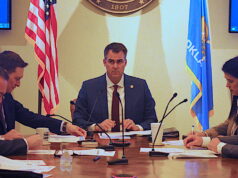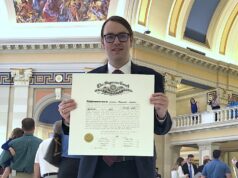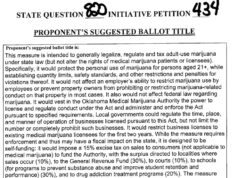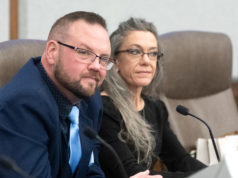
Simone Fulmer is one of the few women in Oklahoma City leading a plaintiff law firm. A mother of two children, Simone opened Fulmer Group in 2014 with a focus on insurance bad faith cases, auto accidents, wrongful death and class actions.
Fulmer Group has supported NonDoc by advertising on our site, and this Q&A is part of that agreement. Mrs. Fulmer’s responses have been lightly edited for style and grammar.
When was the Fulmer Group created, and what are your areas of expertise?
Fulmer Group was created Oct. 1, 2014. We focus on the complex litigation needs of individuals and small businesses, mostly suing insurance companies who refuse to honor their obligations. We see ourselves as the last resource for holding insurance companies accountable to their promises to provide protection.
Your slogan says, “Not your grandad’s law firm.” What do you mean by that and how are you trying to be different from other firms?
We have designed Fulmer Group with two goals in mind: first, that it provide an entirely different working experience for the members of our team, and second, that our clients’ experience through the legal process be as painless as possible.
The team at Fulmer Group works our cases through a “pipeline” of sorts, where the special talents of each team member are capitalized upon, bringing out the best in each of them. What’s more, we are utilizing new technology that puts each client’s case at the fingertips of every team member whenever and wherever they are. Through this approach, our clients’ cases are handled more personally, efficiently and confidently.
What is “insurance bad faith”?
“Insurance bad faith” is a short-hand way of saying that an insurance company has not met its duty of good faith and fair dealing when handling the insurance claim of someone it insures.
We explain it like this. When an insurance company sells you an insurance policy, it is selling you peace of mind that you will not suffer the financial consequences of an unexpected event.
The policy it issues to you is a contract — like any other agreement — and sets forth both your obligations and the obligations of the insurance company. Something along the lines of: You will timely pay your insurance premiums and in return the insurance company will pay benefits as the policy requires if/when the need arises.
But what happens if the insurance company stalls in paying you? What if it drags out the claim payments without a reasonable explanation? What happens if it denies that the policy covers your loss, even though the policy, in fact, does cover you? What happens if the insurance adjuster doesn’t explain to you what the policy covers or how you can claim benefits under the policy? What happens if the insurance company pays part of what it owes you, but not all of it?
In each instance, you are not only being deprived of the policy benefit you purchased, but you are being deprived of your peace of mind. It is the duty of good faith and fair dealing that makes sure the financial peace of mind you purchased is fully protected.
Who do people stereotypically dislike more — insurance companies or lawyers?
What’s worse? The devil you know, or the devil you don’t know?
Our experience tells us that people in general have more experience with insurance companies than with lawyers. This is due to the fact that one cannot drive or get a home mortgage without insurance; insurance is essential to most everyone’s everyday life. On the other hand, most people have never had a reason to hire a lawyer, and many don’t even know one. With this in mind, the Fulmer Group team actively participates in non-profit organizations throughout our community in hopes that, when people think of lawyers, they think of us.
What is the biggest misconception about lawyers?
That we are what you read about in viral email jokes, or that we are only out for ourselves.
How has Oklahoma’s tort reform saga affected lawyers, clients and the state as a whole?
When you are injured as the result of the negligence of someone else, the wrongdoer is responsible for paying your past and future medical bills, paying any income you lost because the injury he or she caused has made you incapable of working, and paying the cost of any special care you might need, including such things as medicine, a special nurse, prosthetic limbs, a wheelchair, accessibility construction, etc. These are called “economic damages.”
Wrongdoers must also pay for your loss of enjoyment of life, the disfigurement and disability they have caused. They must also pay for the physical pain their actions have caused you — the physical pain you have already suffered and that you will continue to suffer into the future. Similarly, they must pay for the mental anguish you have gone through that you would not have gone through but for their actions.
For example, if a wrongdoer’s actions caused your leg to be crushed, then amputated, he is responsible for paying you for your disfigurement, loss of enjoyment of life, the physical pain, past and future, you have suffered when the leg was crushed, then amputated, as well as all of your mental anguish. These type of damages are called “non-economic damages.” As you can see, non-economic damages are the only damages paid directly to you for what you experienced as the result of someone’s wrongful actions; any other sums the wrongdoer is responsible for paying goes to pay someone else who is providing services due to his wrongful conduct.
In 2011, Oklahoma placed a $350,000 cap on non-economic damages in cases of normal negligence. This means that, no matter how bad an injury, how much physical pain and mental anguish one suffers, the most a negligent wrongdoer will ever be responsible to an injured person for his or her harms is $350,000. This cap not only runs the real danger of under compensating someone for the harms caused by a wrongdoer, it substitutes the judgment of the Oklahoma Legislature for that of the jury. Just this past summer, a jury in Oklahoma County compensated a 34-year-old man with a severe brachial plexus injury to his arm with $5 million in non-economic damages.
The jury made its decision based on evidence that the man will experience severe pain for the rest of his life, that he cannot dress himself, care for his three children on his own or get more than three hours of continuous sleep a night. Despite the jury’s finding, the trial judge had no other choice than to cut the non-economic award to $350,000. The cap not only worked to second-guess the jury, but it worked to allow the wrongdoer to pay only a small fraction of the harm he caused.
If you could change one thing in the world, what would that be?
Eliminate all fear.





















